For four decades, Italian suspension firms Ceriani and Marzocchi were the fiercest of competitors. By the end of the 1980s, however, the fortunes of the two companies had declined sharply. Ceriani was acquired by Steve Storz, while Marzocchi tiptoed along in an increasingly cost-sensitive market.
Two years ago, Marzocchi was bought by U.S. Tenneco, owner of automotive suspension giant Monroe. Marzocchi suddenly had access to new technologies, materials and, most importantly, the resources to fund its R&D department, which gave it the spark needed to claw its way back to the top as a technological pioneer.
Leading the way are the company’s highly innovative forks. Work started two years ago, in cooperation with Husqvarna, and included development and testing under the extremes of racing. The goal was to build the lightest and strongest motocross, supermoto and off-road forks. Marzocchi’s 53mm USD53 Shiver fork not only features outer tubes made of aluminum but the male sliders (typically steel) are manufactured of extruded aircraft-grade aluminum, which is heat-treated then lapped to a mirror-like surface and finally hard-anodized.
Marzocchi claims that this procedure creates a surface hardness durable enough to allow test units to survive an entire season of motocross racing without stanchion replacement. The USD53 weighs a little more than 17 pounds (thanks to use of magnesium, titanium and carbon-fiber bits), which Marzocchi claims is 4.5 lb. lighter than any comparable fork. To ensure reliability and consistent performance, sealed cartridge damping units use massive, 26mm pistons.
New and future products include the RAC50 roadracing fork (claimed weight is less than 15 lb.) and a range of electronically adjustable shocks and forks, that Marzocchi hopes to get fitted to the second generation Ducati Multistrada, which currently features a similar Öhlins system.
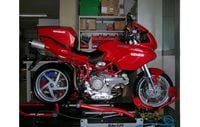
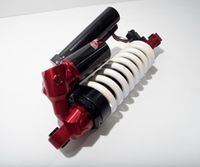
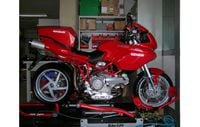
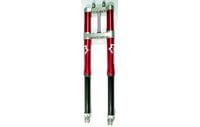
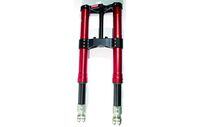
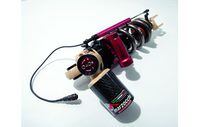
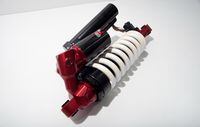
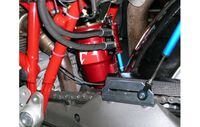
/cloudfront-us-east-1.images.arcpublishing.com/octane/ESEQXKLW2BFADFTTIMGUVUQBOY.jpg)
/cloudfront-us-east-1.images.arcpublishing.com/octane/EHHGX7WY6REFLFPN4LWXVC2QP4.jpg)
/cloudfront-us-east-1.images.arcpublishing.com/octane/YNGKWQRUMJEVLL5HTPPAEHIUQA.jpg)
/cloudfront-us-east-1.images.arcpublishing.com/octane/MB5GFVVTBVFY3PFOAQH5CLZTYM.jpg)
/cloudfront-us-east-1.images.arcpublishing.com/octane/R26K447HPJFXNL7HDNAIY4VOI4.jpg)
/cloudfront-us-east-1.images.arcpublishing.com/octane/U3S3JPJT5REW7NTPZMUP2FZY3A.jpg)
/cloudfront-us-east-1.images.arcpublishing.com/octane/WPQ2LXEKPVFZRF2CZLPSDOMVAI.jpg)
/cloudfront-us-east-1.images.arcpublishing.com/octane/BNSDRE4DCJE5ZPOLGPBZPOMZEI.jpg)
/cloudfront-us-east-1.images.arcpublishing.com/octane/GO6FSVIIKNBVPLSIS7IBWE7AEM.jpg)
/cloudfront-us-east-1.images.arcpublishing.com/octane/CS6TMZNTENGKFDW56HSE2HFZ2M.jpg)
/cloudfront-us-east-1.images.arcpublishing.com/octane/FUFID44YDBAM3EHF2AV5LDHLVE.jpg)
/cloudfront-us-east-1.images.arcpublishing.com/octane/QKEXZXUGVFATPE7RAT3HAHDQZ4.jpg)
/cloudfront-us-east-1.images.arcpublishing.com/octane/T7GEMBOUDBHX7EDP2PRQ2J2XME.jpg)
/cloudfront-us-east-1.images.arcpublishing.com/octane/U4CKRUKLKZD43FDSDLZHBL7YVA.jpg)
/cloudfront-us-east-1.images.arcpublishing.com/octane/OFSXJJ5PZFEZ5D5ZPMCFVHJUMA.jpg)
/cloudfront-us-east-1.images.arcpublishing.com/octane/N2JLNLG44VEKBMEPORRDTMX5A4.jpg)
/cloudfront-us-east-1.images.arcpublishing.com/octane/PYWEGG6FHJD6XLPKICS7XHMMZ4.jpg)
/cloudfront-us-east-1.images.arcpublishing.com/octane/XXFQQQ4AYJDCXDGVW3JTHAYONI.jpg)
/cloudfront-us-east-1.images.arcpublishing.com/octane/WMF36OICPZEJDPKABMHQVHXBZ4.jpg)
/cloudfront-us-east-1.images.arcpublishing.com/octane/3DJ46QYFAJA5RIJILQR2XIZXM4.jpg)
/cloudfront-us-east-1.images.arcpublishing.com/octane/4HYMMY6K4JHMNEQ56FXTGAHKG4.jpg)
/cloudfront-us-east-1.images.arcpublishing.com/octane/KUENZXA3RFBIHIDGHEEVH6YNYE.jpg)
/cloudfront-us-east-1.images.arcpublishing.com/octane/UW6THULV65E4TDI4DWLOMDR7LY.jpg)
/cloudfront-us-east-1.images.arcpublishing.com/octane/5S5CDZTZPJBHJBLHENVXEFYKG4.jpg)